The Car Wreck
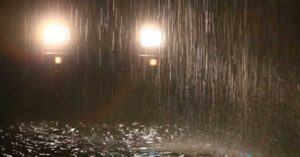 In the dark I saw the sharp bend to the left too late and drove into the turn too fast. I jammed on the brakes and jerked the steering wheel to the left, but the road was slick from the pouring rain. The car went straight. The tires squealed and skidded off the asphalt. Sitting beside me, Randy grabbed the dashboard with both hands as we careened toward a three-rail fence.
In the dark I saw the sharp bend to the left too late and drove into the turn too fast. I jammed on the brakes and jerked the steering wheel to the left, but the road was slick from the pouring rain. The car went straight. The tires squealed and skidded off the asphalt. Sitting beside me, Randy grabbed the dashboard with both hands as we careened toward a three-rail fence.
Time seemed to shift into slow motion. The car’s hood dipped down as the front wheels plunged into a ditch. My chest slammed into the steering wheel. The hood bounced skyward, throwing me back in the seat. The car soared out of the ditch, then crashed back down, still speeding forward.
The bumper struck the base of a fencepost. With the soil softened by a two-day rain, the blow uprooted the post and threw it up on the hood. It came at the windshield like a battering ram and hit the plate glass at eye level. A gory image of my decapitation flashed through my mind, but the windshield held in place and the post launched into the air and flew over the roof. I watched the seams of wooden planks separate and slide across the windshield and heard the broken boards scrape along the sides of the car as it sped through the fence.
 The car zoomed over a little knoll, then pitched forward, and skated down a steep slope of soft wet loam. The headlight beams bounced up and down over a green pasture that descended to a tree-lined ravine a hundred feet below.
The car zoomed over a little knoll, then pitched forward, and skated down a steep slope of soft wet loam. The headlight beams bounced up and down over a green pasture that descended to a tree-lined ravine a hundred feet below.
I stood on the brake, but it had no effect. The car raced down toward the trees like a sled on an icy hillside. Twenty feet. Forty. Fifty. I put all my leg’s strength into the brake, my knee locked, my fists grinding the steering wheel to dust, my jaw clenched so tight I couldn’t breathe.
Sixty feet. Seventy. The headlights fell on a big tree directly in our path at the bottom of the slope. Out of the corner of my eye, I saw Randy brace for the impact.
We’re going to die, I thought.
Then it came to me out of nowhere. I turned the steering wheel as hard to the left as I could. The car kept going straight, but it slowed, then coasted to a full stop, and stalled out.
I leaned back in the seat and let out a heavy breath. Through silver strings of rain, I stared at the broad trunk of the tree. We were so close I could see the texture of its bark.
“You okay?” I asked Randy.
He lit a Marlboro with a trembling hand and drew hard on it. “I’m alive,” he said quietly.
We sat for a long time without saying anything, the only sound the rain pounding on the car’s roof.
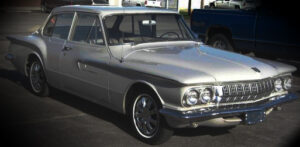 When the adrenaline wore off, it sank into my consciousness that I had wrecked my car, a gray Dodge Lancer my dad bought me for $350, a six-cylinder stick shift I’d named the Bullet as a joke because it didn’t go fast. I stared at the ignition key dangling from the steering column, thinking about the Bullet. Sometimes, it seemed she almost had a personality. Reliable. Determined. Resilient. I tentatively reached for the key and turned it. She started right up. I gave her some gas, then eased off. She idled smoothly.
When the adrenaline wore off, it sank into my consciousness that I had wrecked my car, a gray Dodge Lancer my dad bought me for $350, a six-cylinder stick shift I’d named the Bullet as a joke because it didn’t go fast. I stared at the ignition key dangling from the steering column, thinking about the Bullet. Sometimes, it seemed she almost had a personality. Reliable. Determined. Resilient. I tentatively reached for the key and turned it. She started right up. I gave her some gas, then eased off. She idled smoothly.
Randy shook his head and grinned.
We got out in the pouring rain, walked around to the front end, and stared at the mounds of mud that had piled up at the Bullet’s front wheels to scotch her momentum when I’d turned the steering wheel to the left, almost too late.
The fencepost had gouged a big gash in the Bullet’s grille and front bumper and the busted planks had scratched her sides, but otherwise, her exterior seemed okay. We looked under the hood. There was no visible damage. I took a close look at the windshield. No cracks. Even the wipers still worked.
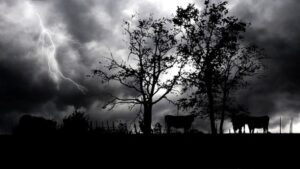 With Randy pushing from the front, I backed the Bullet out of the hole she had dug. Randy climbed in, and I drove her slowly up the slope. Halfway up, I heard a cow bawl and I saw ten or twelve dark figures hulking under trees on a ridge to my left. By the time I drove through the break in the fence and eased the Bullet through the ditch, the rain had lightened up.
With Randy pushing from the front, I backed the Bullet out of the hole she had dug. Randy climbed in, and I drove her slowly up the slope. Halfway up, I heard a cow bawl and I saw ten or twelve dark figures hulking under trees on a ridge to my left. By the time I drove through the break in the fence and eased the Bullet through the ditch, the rain had lightened up.
I stopped on the side of the road and looked back at twin trenches in the mud running through the ditch and the fence and on over the knoll. “I didn’t think I was going that fast.”
“It wasn’t the speed,” Randy said. “You hit the brake too hard coming into the turn. It locked the wheels and we slid out of control.”
Randy would later drive heavy-duty trucks in the Army and public transit buses in D.C. He knew what he was talking about. The crash was my fault. The break in the fence was my responsibility.
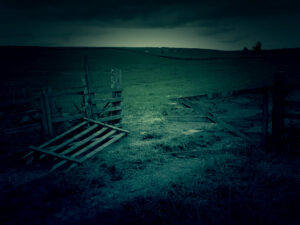 “The cattle will get out,” I said. “We better tell someone.”
“The cattle will get out,” I said. “We better tell someone.”
“I saw a farmhouse back the way we came,” Randy said.
I turned the car around. We found a muddy driveway running down a hill to the farmhouse. The driveway took us around behind the house where I parked between a pick-up truck and a tractor.
It was past midnight and pitch dark, no moon or stars in the drizzling rain, no light in or around the house. Waking up country people in the middle of the night is a risky proposition, but at sixteen I didn’t know enough to be afraid.
Randy and I were headed toward the back porch when the distinctive sound of a shotgun being racked pierced the silence and a blinding light hit us between the eyes.
I froze.
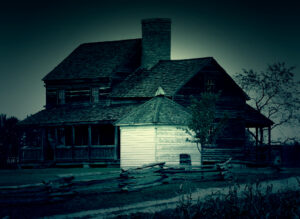 “Who are ya and whaddaya want?” A hoarse angry voice.
“Who are ya and whaddaya want?” A hoarse angry voice.
“Name’s Ken Oder,” I said, my voice shaking. “I ran my car through your fence. Your cattle can get out through the break.”
“He’s tellin the truth!” A high-pitched scratchy voice. “I heard the crash!”
The blinding light went off. A porch light came on. A bean pole dressed in long johns with a spotlight in one hand and a rifle in the other stood beside a short stumpy woman wearing a flannel nightgown and armed with a pump-action shotgun. “Put on your slicker,” she barked at the old man. “Take ‘em up the hill and fix the fence ‘fore the cows run all over creation.” They shuffled through a screen door and disappeared inside the house without another word.
“Damned if I go anywhere with you again,” Randy muttered. “Second time tonight you almost got us killed.”
The old man came out wearing a raincoat over his long johns and threw some planks in the truck bed. We rigged up a temporary fence that night. I went back in the morning and helped him sink a new post and nail up rails. He wouldn’t let me pay for the damages. “Crazy sumbitches run through this fence all a time in a big rain,” he said. “You the only one ever come and told me. We’re square.”
Dad took the Bullet to a church member who was an auto mechanic. He adjusted the front end alignment, removed a splinter from the radiator, and sealed up the pinhole. Cost about thirty bucks. I never fixed the big dent in the grille and bumper.
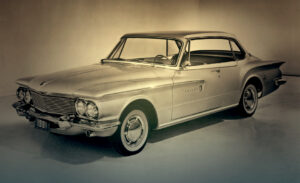 Sporting her broken nose and busted lip, the Bullet clocked 100,000 miles after the wreck, taking me everywhere I wanted to go from my high school years all the way through UVA, trips to Florida on spring breaks, out to Yellowstone Park, down through Wyoming, Colorado, and Texas, all across the southeast, scores of runs to Mary Baldwin to court my auburn-haired blind date, and several nerve-wracking missions to Aiken, South Carolina, trying to convince her to marry me.
Sporting her broken nose and busted lip, the Bullet clocked 100,000 miles after the wreck, taking me everywhere I wanted to go from my high school years all the way through UVA, trips to Florida on spring breaks, out to Yellowstone Park, down through Wyoming, Colorado, and Texas, all across the southeast, scores of runs to Mary Baldwin to court my auburn-haired blind date, and several nerve-wracking missions to Aiken, South Carolina, trying to convince her to marry me.
They say a car is just a pile of metal parts put together a certain way. Generally, that’s true, I guess. I’ve owned twenty-three cars over my long life. Twenty-two of them had no soul.
The Bullet was different. She was my steady companion through seven of the best years of my life. I came of age with her, and I cried when I had to give her up. I loved that old car, and fifty years after we parted, I still miss her.



March 4, 2021 @ 5:25 pm
Ken, I simply love the glimpses you share of our past life in Albemarle County. My Bullet was a blue bug (VW) that I had the pleasure of plowing into a fence on Garth Road. Similar story, only daytime and no rain .….. the owner was equally as gracious. Keep the stories coming — love your insight into our formative years. Blessings to you and your family.
March 5, 2021 @ 7:55 am
Thanks, Dan, for the kind words and for following my blog. Our car wrecks were pretty close to one another. My wreck was on a country road that cut across from Ivy to Garth Road. Those roads were narrow and curvy back then. We had to learn to be a reasonably good driver to survive them. Hope you and your family are safe and well.
March 3, 2021 @ 6:34 am
This is a test
March 3, 2021 @ 6:35 am
this is a test
March 2, 2021 @ 1:00 am
This is a test comment
March 1, 2021 @ 2:06 pm
No surprise Ken that you went back and owned up to crashing through the fence. Good story.
March 2, 2021 @ 8:21 am
Thanks! Not sure I’d do it again today, though, after facing down that shotgun.
March 1, 2021 @ 1:20 pm
Great story <3 Loved it …
March 2, 2021 @ 8:20 am
Thanks, Janet!
February 27, 2021 @ 8:11 am
What a GREAT STORY.??
February 27, 2021 @ 8:18 am
Thanks, John!
February 26, 2021 @ 2:56 pm
Great story. So glad you were safe. My car like that was a 60 Ford Galaxie 500. It was as big as a boat- and I could cram eight teenage girls in it. It ate gas… but I loved it. I have been trying to remember how many cars I have owned. I don’t think it is anyplace near 23. Maybe 10.
February 26, 2021 @ 3:26 pm
Thanks, Ursula. I remember the big Ford Galaxie. It was a great car, but like you said, a gas guzzler. I didn’t realize I owned so many cars until Cindy and I counted them up. A lot of them were lemons that died a swift death. We laugh about them today, but not back then.
February 26, 2021 @ 2:52 pm
Ken, another great story by a terrific author. As I read about your 23 cars, I smiled at thoughts of the Jaguar. You once said that between the two of us, one of us usually had a Jaguar that ran! Thanks for the story and the smile its ending put on my face.
All the best,
Dave
February 26, 2021 @ 3:23 pm
Thanks, Dave. That Jaguar was a floating oil slick, the worst car I ever owned. It was a lot prettier than the Bullet, proving beauty is sometimes only skin deep. Great to hear from you, Dave. Hope you and Tammy are staying safe and well.
March 27, 2021 @ 6:14 pm
Ken, I was born in ’56, and nowadays I can honestly say I believe your Bullet is BEAUTIFUL! Blemishes and all (those just add character?); I have learned one thing for sure — treasure the old as well as the new, the old are full of history and stories…keep pulling those wonderful stories of yours, Ken. I remsin your faithful fan,
March 28, 2021 @ 8:35 am
Thank you, Marcie, for your kind words and for following my blog. The Bullet was beautiful, inside more than outwardly, and you’re right about treasuring the old as well as the new.
February 26, 2021 @ 1:43 pm
Great story, Ken! I had a van called the Silver Bullet.
February 26, 2021 @ 1:45 pm
Thanks, Bobby! Great minds name their cars alike, I guess.
February 26, 2021 @ 1:13 pm
I think
I remember your car. I wish I still had my 69 Mustang Grande. 40 years after I sold her (why I don’t remember) in a discussion with a woman, Kate, who I was destined to marry, I discovered she had been driving the very same car at the same time at home in New Jersey. Same make, model, engine, color, black top and interior. Sadly she still doesn’t know if she had the optional 8‑track player.
February 26, 2021 @ 1:22 pm
What a coincidence. Your relationship was meant to be, I guess. I wish I still had the Bullet, too, although she wouldn’t be worth much as an antique. Your 69 Mustang Grande would be priceless.
February 26, 2021 @ 11:57 am
They sure don’t make them like they used to! What a great story you have shared. I’ll need to share it with my college roommate who lives on a cow farm. She continuously tells me “fence stories “ and… the farmer was correct. Hardly ever do the culprits ever tell what happened!
February 26, 2021 @ 1:14 pm
The farmer said most of the wrecks to his fence happened on that same turn. It was a country road that ran from Ivy over to Garth Road, narrow and curvy, and that particular bend was almost ninety degrees. Thanks for sharing my post!
February 26, 2021 @ 11:21 am
Wow! You really had me hooked on this one. I am a multi-tasker by nature, so I usually edit a photo, glance at the print, and move back to Lightroom. I turned off all sound, shut down other screens, and locked in on this story.
Bravo!
February 26, 2021 @ 1:11 pm
Thanks, Michele! It was an easy story to write. I still remember every detail of that wreck vividly.
February 28, 2021 @ 8:53 am
Saw you had a Jaguar. Dick had a 67 Jaguar when I met him. Yes I will have to admit, that sweetned the pot. Last yr they made the French racing light covers. XKE. Love that car but as you said always required work. Finally sold it to Chesterfield retired county administrator here.
That was 15 yrs ago, He’s got $30,000 in it so far and still not on the road. Sexy car for sure!
March 1, 2021 @ 9:22 am
I owned an ice-blue 1985 Jaguar XK8, sleek lines, beautiful body style. Best looking car I ever owned. Worst performing, too. They were notorious for electrical problems. Mine would conk out suddenly for no apparent reason rolling along at 70 mph on the freeway. Other times, it just wouldn’t start, then it would, then it wouldn’t again. It also leaked oil. In buckets. After Ford bought Jaguar in the late 90’s, the reliability improved. I fell in love with a little baby blue 2003 XJ8 convertible sports car. I still own it. Runs like a top. If you look at Groundhog Day in Paradise and scroll down to the bottom of the post, there’s a photo of Zoey and P.D. sitting in it. That Jag almost makes up for the first one! Sounds like Dick’s 67 was about as reliable as my 85.
February 26, 2021 @ 10:40 am
Awesome. Loved your description of your accident. If we are lucky, we each have a Bullet as we experience the best years of our lives. Mine was a green ‘65 Mustang with stickers from Mary Baldwin, Randy Mac and UVA in the rear window. Once I hauled eight of us back to Charlottesville from a roll to the Pines at Randy Mac — with a stop at the Texas Inn. There are more stories with that car; however, some stories are best untold. ?
But thanks for telling yours, Ken! We love them!
February 26, 2021 @ 1:10 pm
I drove that Mustang once. A special car for sure. Thanks for the kind words, as always. Stay safe out there.
February 26, 2021 @ 10:23 am
Breathtaking and tears. A great short story that almost made me cry.
I had a car like it!
February 26, 2021 @ 1:08 pm
Thanks, Pat. That car meant a lot to me. She carried me through some great times.